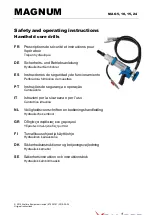
2.
Use personal protective equipment. Always
wear eye protection.
Protective equipment such
as dust mask, non-skid safety shoes, hard hat, or
hearing protection used for appropriate conditions
will reduce personal injuries.
3.
Prevent unintentional starting. Ensure the
switch is in the off-position before connecting
to power source and/or BATTERY pack, pick-
ing up or carrying the tool.
Carrying power tools
with your finger on the switch or energising power
tools that have the switch on invites accidents.
4.
Remove any adjusting key or wrench before
turning the power tool on.
A wrench or a key left
attached to a rotating part of the power tool may
result in personal injury.
5.
Do not overreach. Keep proper footing and
balance at all times.
This enables better control
of the power tool in unexpected situations.
6.
Dress properly. Do not wear loose clothing or
jewellery. Keep your hair, clothing and gloves
away from moving parts.
Loose clothes, jewel
-
lery or long hair can be caught in moving parts.
7.
If devices are provided for the connection of
dust extraction and collection facilities, ensure
these are connected and properly used.
Use of
dust collection can reduce dust-related hazards.
8.
Do not let familiarity gained from frequent use of
tools allow you to become complacent and ignore
tool safety principles.
A careless action can cause
severe injury within a fraction of a second.
9.
Always wear protective goggles to protect your
eyes from injury when using power tools.The
goggles must comply with ANSI Z87.1 in the USA.
It is an employer's responsibility to enforce
the use of appropriate safety protective equip-
ments by the tool operators and by other per-
sons in the immediate working area.
Power tool use and care
1.
Do not force the power tool. Use the correct
power tool for your application.
The correct
power tool will do the job better and safer at the
rate for which it was designed.
2.
Do not use the power tool if the switch does
not turn it on and off.
Any power tool that cannot
be controlled with the switch is dangerous and
must be repaired.
3.
Disconnect the plug from the power source
and/or remove the BATTERY pack, if detach-
able, from the power tool before making any
adjustments, changing accessories, or stor-
ing power tools.
Such preventive safety mea
-
sures reduce the risk of starting the power tool
accidentally.
4.
Store idle power tools out of the reach of chil-
dren and do not allow persons unfamiliar with
the power tool or these instructions to operate
the power tool.
Power tools are dangerous in the
hands of untrained users.
5.
Maintain power tools and accessories. Check
for misalignment or binding of moving parts,
breakage of parts and any other condition that
may affect the power tool’s operation. If dam-
aged, have the power tool repaired before use.
Many accidents are caused by poorly maintained
power tools.
6.
Keep cutting tools sharp and clean.
Properly
maintained cutting tools with sharp cutting edges
are less likely to bind and are easier to control.
7.
Use the power tool, accessories and tool bits
etc. in accordance with these instructions, tak-
ing into account the working conditions and
the work to be performed.
Use of the power tool
for operations different from those intended could
result in a hazardous situation.
8.
Keep handles and grasping surfaces dry, clean
and free from oil and grease.
Slippery handles and
grasping surfaces do not allow for safe handling and
control of the tool in unexpected situations.
9.
When using the tool, do not wear cloth work
gloves which may be entangled.
The entangle-
ment of cloth work gloves in the moving parts may
result in personal injury.
BATTERY tool use and care
1.
Recharge only with the charger specified by
the manufacturer.
A charger that is suitable for
one type of BATTERY pack may create a risk of
fire when used with another BATTERY pack.
2.
Use power tools only with specifically des
-
ignated BATTERY packs.
Use of any other
BATTERY packs may create a risk of injury and fire.
3.
When BATTERY pack is not in use, keep it
away from other metal objects, like paper clips,
coins, keys, nails, screws or other small metal
objects, that can make a connection from one
terminal to another.
Shorting the BATTERY termi-
nals together may cause burns or a fire.
4.
Under abusive conditions, liquid may be
ejected from the BATTERY; avoid contact. If
contact accidentally occurs, flush with water.
If liquid contacts eyes, additionally seek med-
ical help.
Liquid ejected from the BATTERY may
cause irritation or burns.
5.
Do not use a BATTERY pack or tool that is
damaged or modified.
Damaged or modified
batteries may exhibit unpredictable behaviour
resulting in fire, EXPLOSION or risk of injury.
6.
Do not expose a BATTERY pack or tool to fire
or excessive temperature.
Exposure to fire or
temperature above 130 °C may cause explosion.
7.
Follow all charging instructions and do not
charge the BATTERY pack or tool outside the
temperature range specified in the instruc
-
tions.
Charging improperly or at temperatures
outside the specified range may damage the
BATTERY and increase the risk of fire.
Service
1.
Have your power tool serviced by a qualified
repair person using only identical replacement
parts.
This will ensure that the safety of the power
tool is maintained.
2.
Never service damaged BATTERY packs.
Service of BATTERY packs should only be per
-
formed by the manufacturer or authorized service
providers.
3.
Follow instruction for lubricating and chang-
ing accessories.
4.
Do not modify or attempt to repair the appli-
ance or the BATTERY pack except as indicated
in the instructions for use and care.



























